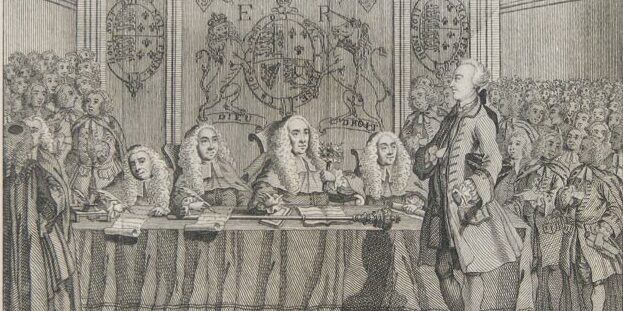The controversy over Nazis on Substack highlights the shift from "debate your enemies" to "destroy your enemies."
Where Are the Free Speech Martyrs?
Why does free speech have no martyrs? Answering this simple question isn’t straightforward, so let me take you through the steps of an argument.
First, we need to pause over the word “martyr.” There is a sense in which every religious martyr dies (I use the present tense deliberately) because they are prevented from speaking freely; but they die primarily for their religious faith, not for the principle of free speech, and of course many religious martyrs through the ages (all Jesuits for example) have been opposed to the principle of free speech.
I take it that martyrdom involves a deliberate act of refusing to conform to the demands of others. Thus you can’t accidentally become a martyr. Salman Rushdie bravely defended the principle of free speech after the publication of his Satanic Verses, and has almost paid with his life, but I doubt that he foresaw the possible consequences when he embarked on publication.
It will be evident I am using the word “martyr” in a secular sense. Those prepared to die for their principles, and especially those practising non-violence, are offering themselves as secular martyrs: I’m thinking of the suffragettes on hunger strike, of Gandhi, of Martin Luther King. Very often, of course, the immediate response of the authorities is to try to prevent such people from becoming martyrs: thus the suffragettes were force-fed. There is a long list of people who have shown themselves prepared to die for a principle while practising non-violence, but no one I can think of whose primary purpose was the defence of free speech.
The eighteenth century was the crucial period in the battle against censorship, but that battle was conducted, both by the intellectuals who defended free speech and the authorities who opposed it, with considerable prudence. Spinoza was excluded from the Jewish community. His crucial works were published posthumously, but the secular authorities left him alone. Hume was denied jobs because of his evident religious scepticism, but he held back publication of his Dialogues Concerning Natural Religion and other works during his life. Voltaire had many of his books burnt and banned, but in a long publishing career, from 1719 to 1778, he never once saw the inside of a prison (though an earlier imprisonment, for circulating seditious poetry, had certainly been formative). La Mettrie had to flee France for publishing materialist works, but his life was never in danger. Diderot was briefly imprisoned and then was careful about what he published—much of his best work appearing posthumously. Great men, but no martyrs.
The nearest to a martyr for free inquiry is young Thomas Aikenhead, executed for blasphemy in Edinburgh in 1687. Aikenhead held that “it is a principle innate and co-natural to every man to have an insatiable inclination to the truth, and to seek for it as for hid treasure.” He died because he was not prepared to pretend to believe in the truth of the Christian religion. In France, Francois de la Barre was executed for blasphemy in 1766—but he was accused of impious actions as well as impious speech.
The Aikenhead case reminds us that the authorities were perfectly willing to kill. In France, the last Protestant minister to be executed for performing his religious duties died in 1762. The simple truth is that Enlightenment philosophers had no wish to become martyrs, and the authorities were often interested in banning books, but never keen to execute their authors (hence the symbolic importance of Vanini, executed in 1619 and misleadingly hailed in the eighteenth century as a martyr for atheism, so that the unbelievers could claim one, if only one, martyr).
The distinction between burning books and burning people was fundamental in France. Books were often burnt, but their authors kept out of trouble as long as they were careful to conceal their identity, and printers ended up in gaol but not readers. Irreligious manuscripts circulated widely, but no one got into trouble for reading them, or even for writing them. It was the book trade that was regulated, not people’s private thoughts. It would not have been difficult for a Voltaire or a Diderot or a d’Holbach to make himself a martyr for free speech, but to do so they would have had to own an explicitly atheistic or a seditious text. And this, quite naturally you may think, they refused to do.
Thus, Enlightenment authorities had no desire to make martyrs, and Enlightenment philosophers had no desire to be martyrs. If Enlightenment philosophers had one thing in common it was the belief that one should pursue pleasure and flee pain. Some sought to defend heroism on the battlefield, but none sought to defend the principle of free speech in symbolic self-sacrifice. Voltaire might write a play about Socrates, but he had no intention of sharing Socrates’ fate. We may trace this refusal back to the trial of Galileo: Galileo recanted to avoid torture and possible execution, but he continued to publish by smuggling manuscripts to Protestant Holland. Offered the chance to be a martyr for the new science, he opted instead to superficially conform while secretly continuing his intellectual struggle.
What made this accommodation possible was that, for both the authorities and the philosophers, books could stand in place of the people who wrote them. Books were written knowing they would be banned, and they were symbolically burned knowing this would simply increase their price on the black market and boost their sales. In a manuscript culture, every heretic is an Aikenhead, speaking aloud his shocking beliefs. In a print culture, a philosopher like Voltaire can attend Mass and claim to be a Catholic, while printing, anonymously and pseudonymously, an endless stream of attacks on religion. Voltaire could even insist on dying a (nominal) Catholic in order to protect his heirs in their claims on his estate.
What also made it possible is that most Enlightenment philosophers held a version of the double truth theory. Few followed Bayle in arguing that a society of atheists would be no worse (and no better) than a society of Christian believers. Most insisted that it was convenient that the majority retained a belief in heaven and hell even if they themselves refused to be taken in by such myths. Warburton was widely understood to have decisively refuted Bayle and to have demonstrated that belief in immortality was essential for social order. “Here I stand, I can do no other,” Luther is supposed to have said. But to take such a stand you need to believe not only that the salvation of your soul (or something else of preeminent importance) is at stake, but also that the stand you are taking may serve as an example to everyone who hears of it, not just to an educated and enlightened minority.
Free speech now requires that its advocates should imitate Socrates, not Voltaire or even Hume.
Does it matter that there were (and perhaps are, if we exclude those, like Navalny, who speak up for a political cause) no martyrs for free speech? Should those of us who believe in free speech be proud that our predecessors did not believe in symbolic self-sacrifice, thereby breaking with a long religious tradition, or should we rather be ashamed of the lies and the misrepresentations in which they engaged in order to protect themselves from persecution?
In a world of cancel culture, these questions are once more becoming relevant. Should those who are employed by universities that impose “woke” principles on staff and students temporise? Or should they accept that mini-martyrdom is constituted by the loss of employment, by public denunciation, and by the denial of publication?
Each individual must think these questions through for themselves. But the double truth practices of the eighteenth century can no longer work in the internet age for the old distinction between private conversation and publication has effectively broken down. Free speech now requires that its advocates should imitate Socrates, not Voltaire or even Hume.
Hence my admiration for those, such as Kathleen Stock, formerly Professor of Philosophy at the University of Sussex, who have lived out the principle of free speech, so often honored only with lip service, in brave and uncompromising practice. Stock—and many other brave women—have insisted that there are only two sexes; that you cannot change sex; that people with variations of sexual development (“intersex”) are either male or female; that biological males cannot be lesbians; that it is unfair (and often unsafe) for biological males to compete as women in sporting competition. As a result, Stock was hounded out of her academic position, and, as I write there has been a recent campaign to prevent her from speaking in a debate at Oxford University. (One should read Stock’s views expressed in her own words: Material Girls: Why Reality Matters to Feminism).
It is a peculiar characteristic of the debate about the rights and status of transgender people that it is inextricably bound up with questions of free speech. “No platforming” (as it is called in the United Kingdom) is a deliberate policy of refusing to allow those with whom one disagrees to speak. Where speech is permitted it is effectively compelled: the terms “sex” and “gender,” “male” and “female,” “he” and “she” are given new meanings which are then imposed on others, who are (or at least were) excluded from employment if they refuse to comply. Even orthography is compelled (one must write “trans woman”, not, under any circumstances, “transwoman”). Thus a dictionary definition, “Adult human female,” the definition of “woman”, has become the rallying cry for a free speech movement.
In England and Wales it has now been established, thanks to the indomitable Maya Forstater, (Forstater v. CGD) that an employer cannot dismiss someone for the temperate expression of what are called “gender critical” views, such as the view that one cannot change sex. The exercise of free speech in this area is now protected in law, although the issue remains intensely contested. In Scotland a comedy club, under threat of litigation, recently had to apologise to a prominent politician, Joanna Cherry, for withdrawing an invitation to speak on the (spurious) grounds that staff would feel uncomfortable listening to her express her views: the club under Scottish (as under English) law was intending to discriminate against her because of her beliefs which are, as a result of the Forstater case, protected in law. (The best introduction to the legal issues in England and Wales, and indeed to the wider philosophical issues, is the skeleton argument presented by Forstater’s barristers, Ben Cooper KC and Anya Palmer, to the appeal court. For the Scottish case see the decisive legal opinion of Aidan O’Neill KC here).
Stock, Forstater, and Cherry are no martyrs and were only briefly victims; but they have stood firm and defiant at great personal cost. Of such stuff are martyrs made.



